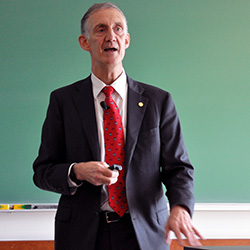Ed Lazowska Discusses New Roles for Computer Science
Lazowska’s visit was a part of Northwestern Engineering’s Dean Seminar Series on April 25
When Ed Lazowska learned he had high cholesterol, he didn’t view it as a health scare. Instead, he saw it as a big data challenge.
His colleagues at the University of Washington had recently launched Arivale, a startup aimed to improve health through genetics. After running multiple tests, including full genome sequencing and microbiome screening, Arivale discovered that Lazowska’s diet was to blame — but not in the way one might expect.
 “I had high levels of mercury in my blood,” said Lazowska, the Bill & Melinda Gates Chair of Computer Science and Engineering at the University of Washington. “I had been eating tuna sushi for lunch three times a week. I changed to salmon, my mercury level dropped, and my cholesterol is fine.”
“I had high levels of mercury in my blood,” said Lazowska, the Bill & Melinda Gates Chair of Computer Science and Engineering at the University of Washington. “I had been eating tuna sushi for lunch three times a week. I changed to salmon, my mercury level dropped, and my cholesterol is fine.”
As a part of the Northwestern Engineering’s Dean’s Seminar Series, Lazowska discussed Arivale and other startups that demonstrate how computer science is expanding into new arenas. “Computer Science: The Ever-expanding Sphere” took place on Monday, April 25 in the Ford Motor Company Engineering Design Center.
For the past four decades, computer scientists and engineers have focused on systems, theory, and languages. But Lazowska argued that this view is now too narrow. The field has expanded to include areas that might not seem related to computer science, such as medicine, energy and sustainability, and education. This is already evident as 70 percent of today’s computer science jobs are not in the computing industry.
“Everyone needs to know some computer science,” Lazowska said. “It’s a way of approaching the world.”
More and more, researchers are using computer science to make advances in disparate spaces through what they know best: machine learning, big data science, cloud computing, robotics, sensors, and more. Arivale, for example, uses big data analysis to develop recommendations for personalized medicine. Another University of Washington startup, called ElectriSense, uses a single sensor to provide usage data for all home electronics, allowing homeowners to see how much electricity is used by every single item in the house.
“This doesn’t mean that working in core computer science is any less important,” Lazowska said. “It can motivate work in other areas that tackle societal challenges.”
The University of Washington encourages boundary-blurring computer science work by establishing agile, interdisciplinary institutes and centers, including its eScience Institute, which Lazowska directs. The Institute engages researchers across disciplines in developing and applying advanced computational methods and tools to confront societal problems, such as homelessness.
Although computer science is thriving within universities, it is still struggling in the outside world. The subject is only taught in 25 percent of US high schools and rarely included in textbooks. In 22 states, computer science does not count toward the math or science graduation requirement. Yet Lazowska is encouraged that these numbers improve every year.
“Progress is still being made,” Lazowska said. “As student interest continues to grow, we have to respond by growing programs.”